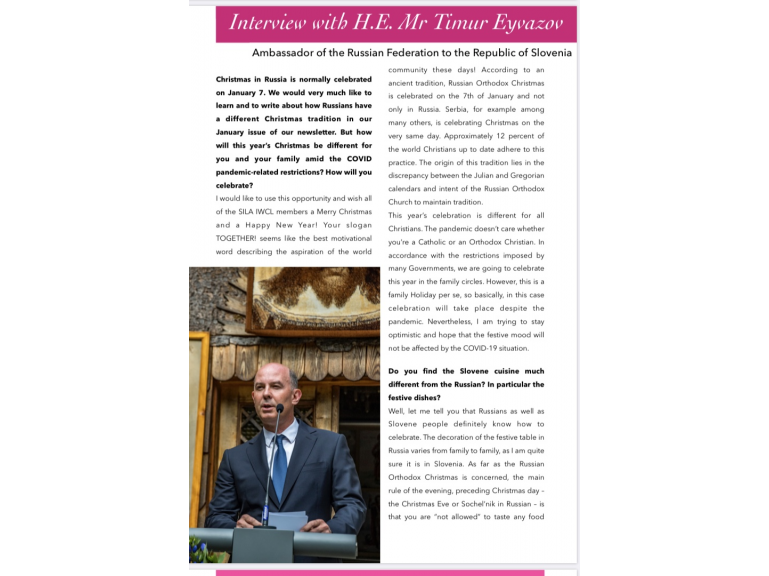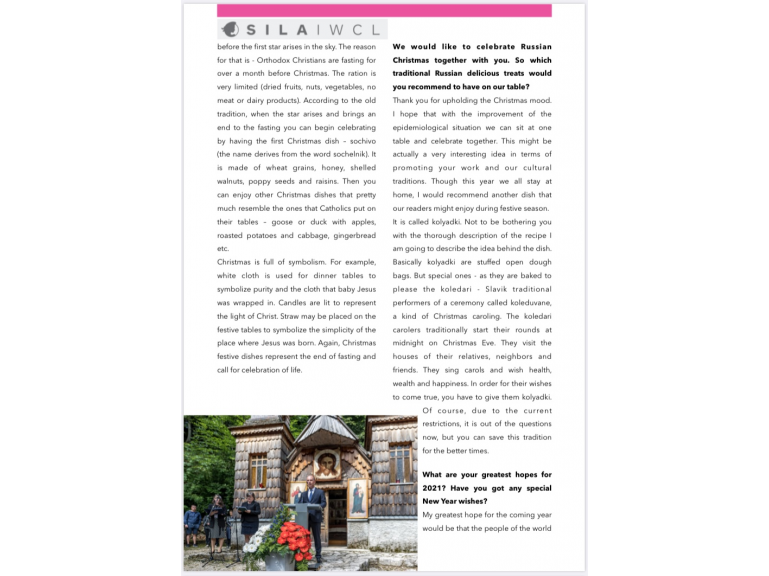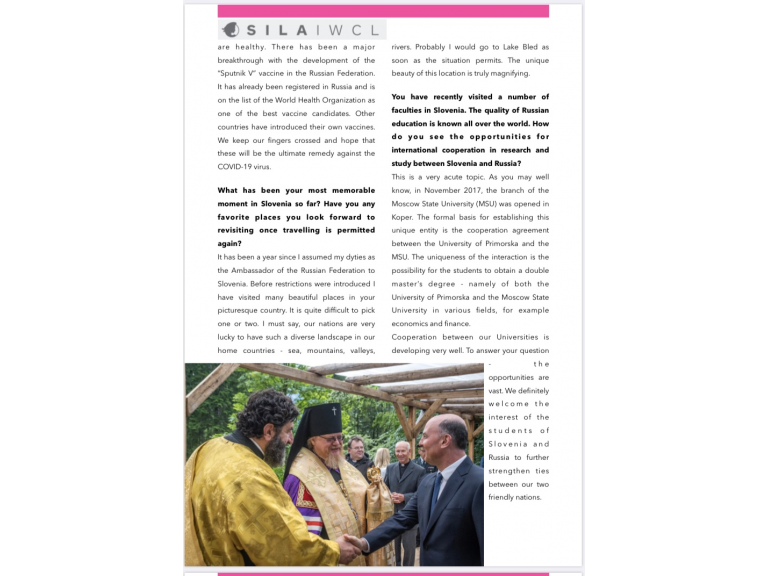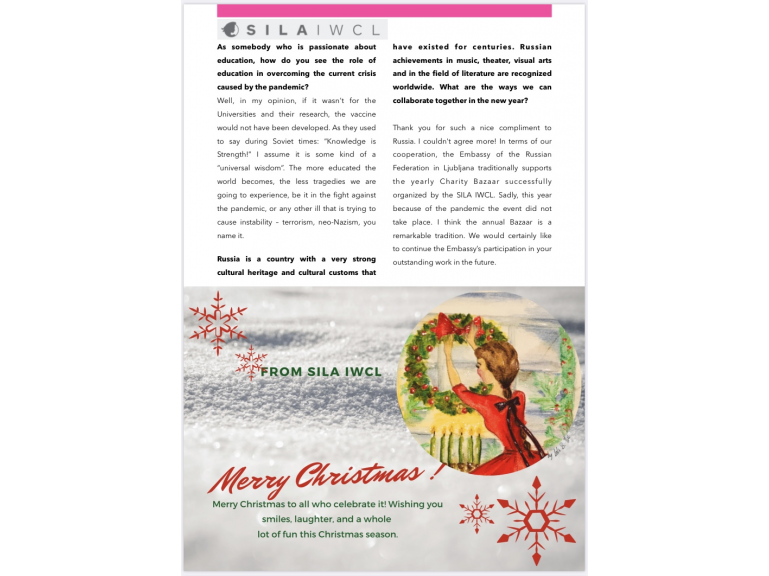Interview of the Ambassador of the Russian Federation to the Republic of Slovenia Mr. Timur Eyvazov for the non-governmental organization SILA-International Women’s Club Ljubljana
Interview of the Ambassador of the Russian Federation to the Republic of Slovenia Mr. Timur Eyvazov for the non-governmental organization SILA-International Women’s Club Ljubljana (www.sila.si)
1. Christmas in Russia is normally celebrated on January 7. We would very much like to learn and to write about how Russians have a different Christmas tradition in our January issue of our newsletter. But how this year’s Christmas be different for you and your family amid the COVID pandemic-related restrictions? How will you celebrate?
I would like to use this opportunity and wish all of the SILA IWCL members a Merry Christmas and a Happy New Year! Your slogan TOGETHER! seems like the best motivational word describing the aspiration of the world community these days! According to an ancient tradition, Russian Orthodox Christmas is celebrated on the 7th of January and not only in Russia. Serbia, for example among many others is celebrating Christmas on the very same day. Approximately 12 percent of the world Christians up to date adhere to this practice. The origin of this tradition lies in the discrepancy between the Julian and Gregorian calendars and intent of the Russian Orthodox Church to maintain tradition.
This year’s celebration is different for all Christians. The pandemic doesn’t care whether you’re a Catholic or an Orthodox Christian. In accordance with the restrictions imposed by many Governments, we are going to celebrate this year in the family circles. However, this is a family Holiday per se, so basically, in this case celebration will take place despite the pandemic. Nevertheless, I am trying to stay optimistic and hope that the festive mood will not be affected by the COVID-19 situation.
2. Do you find the Slovene cuisine much different from the Russian? In particular the festive dishes?
Well, let me tell you that Russians as well as Slovene people definitely know how to celebrate. The decoration of the festive table in Russia varies from family to family, as I am quite sure it is in Slovenia. As far as the Russian Orthodox Christmas is concerned, the main rule of the evening, preceding Christmas day – the Christmas Eve or Sochel’nik in Russian – is that you are “not allowed” to taste any food before the first star arises in the sky. The reason for that is - Orthodox Christians are fasting for over a month before Christmas. The ration is very limited (dried fruits, nuts, vegetables, no meat or dairy products). According to the old tradition, when the star arises and brings an end to the fasting you can begin celebrating by having the first Christmas dish – sochivo (the name derives from the word sochelnik). It is made of wheat grains, honey, shelled walnuts, poppy seeds and raisins. Then you can enjoy other Christmas dishes, that pretty much resemble the ones that Catholics put on their tables – goose or duck with apples, roasted potatoes and cabbage, gingerbread etc.
Christmas is full of symbolism. For example, white cloth is used for dinner tables to symbolize purity and the cloth that baby Jesus was wrapped in. Candles are lit to represent the light of Christ. Straw may be placed on the festive tables to symbolize the simplicity of the place where Jesus was born. Again, Christmas festive dishes represent the end of fasting and call for celebration of life.
3. We would like to celebrate Russian Christmas together with you. So which traditional Russian delicious treats would you recommend to have on our table?
Thank you for upholding the Christmas mood. I hope that with the improvement of the epidemiological situation we can sit at one table and celebrate together. This might be actually a very interesting idea in terms of promoting your work and our cultural traditions. Though this year we all stay at home, I would recommend another dish that our readers might enjoy during festive season. It is called kolyadki. Not to be bothering you with the thorough description of the recipe I am going to describe the idea behind the dish. Basically kolyadki are stuffed open dough bags. But special ones - as they are baked to please the koledari - Slavik traditional performers of a ceremony called koleduvane, a kind of Christmas caroling. The koledari carolers traditionally start their rounds at midnight on Christmas Eve. They visit the houses of their relatives, neighbors and friends. They sing carols and wish health, wealth and happiness. In order for their wishes to come true, you have to give them kolyadki. Of course, due to the current restrictions, it is out of the questions now, but you can save this tradition for the better times.
4. What are your greatest hopes for 2021? Have you got any special New Year wishes?
My greatest hope for the coming year would be that the people of the world are healthy. There has been a major breakthrough with the development of the “Sputnik V” vaccine in the Russian Federation. It has already been registered in Russia and is on the list of the World Health Organization as one of the best vaccine candidates. Other countries have introduced their own vaccines. We keep our fingers crossed and hope that these will be the ultimate remedy against the COVID-19 virus.
5. What has been your most memorable moment in Slovenia so far? Have you any favorite places you look forward to revisiting once travelling is permitted again?
It has been a year since I assumed my dyties as the Ambassador of the Russian Federation to Slovenia. Before restrictions were introduced I have visited many beautiful places in your picturesque country. It is quite difficult to pick one or two. I must say, our nations are very lucky to have such a diverse landscape in our home countries - sea, mountains, valleys, rivers. Probably I would go to Lake Bled as soon as the situation permits. The unique beauty of this location is truly magnifying.
6. You have recently visited a number of faculties in Slovenia. The quality of Russian education is known all over the world. How do you see the opportunities for international cooperation in research and study between Slovenia and Russia?
This is a very acute topic. As you may well know, in November 2017, the branch of the Moscow State University (MSU) was opened in Koper. The formal basis for establishing this unique entity is the cooperation agreement between the University of Primorska and the MSU. The uniqueness of the interaction is the possibility for the students to obtain a double master’s degree - namely of both the University of Primorska and the Moscow State University in various fields, for example economics and finance.
Cooperation between our Universities is developing very well. To answer your question - the opportunities are vast. We definitely welcome the interest of the students of Slovenia and Russia to further strengthening ties between our two friendly nations.
7. As somebody who is passionate about education, how do you see the role of education in overcoming the current crisis caused by the pandemic?
Well, in my opinion, if it wasn’t for the Universities and their research, the vaccine would not have been developed. As they used to say during Soviet times: “Knowledge is Strength!” I assume it is some kind of a “universal wisdom”. The more educated the world becomes, the less tragedies we are going to experience, be it in the fight against the pandemic, or any other ill that is trying to cause instability – terrorism, neo-Nazism, you name it.
8. Russia is a country with a very strong cultural heritage and cultural customs that have existed for centuries. Russian achievements in music, theater, visual arts and in the field of literature are recognized worldwide. What are the ways we can collaborate together in the new year?
Thank you for such a nice compliment to Russia. I could not agree more! In terms of our cooperation, the Embassy of the Russian Federation in Ljubljana traditionally supports the yearly Charity Bazaar successfully organized by the SILA IWCL. Sadly, this year because of the pandemic the event did not take place. I think the annual Bazaar is a remarkable tradition. We would certainly like to continue the Embassy’s participation in your outstanding work in the future.





